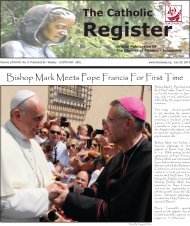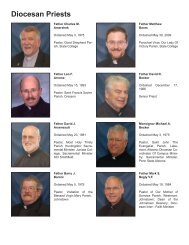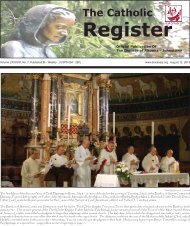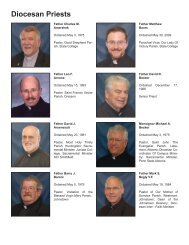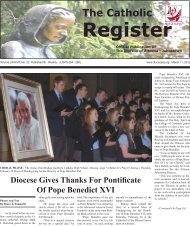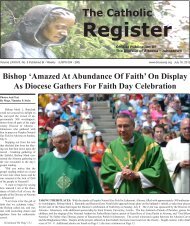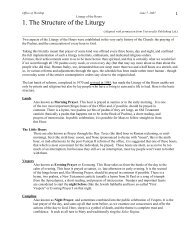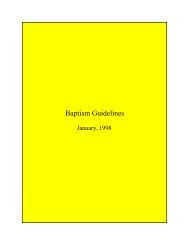encyclical letter deus caritas est of the supreme pontiff benedict xvi ...
encyclical letter deus caritas est of the supreme pontiff benedict xvi ...
encyclical letter deus caritas est of the supreme pontiff benedict xvi ...
Create successful ePaper yourself
Turn your PDF publications into a flip-book with our unique Google optimized e-Paper software.
dimly perceived that man's real food—what truly nourishes him as man—is ultimately <strong>the</strong> Logos,eternal wisdom: this same Logos now truly becomes food for us—as love. The Eucharist draws usinto Jesus' act <strong>of</strong> self-oblation. More than just statically receiving <strong>the</strong> incarnate Logos, we enter into<strong>the</strong> very dynamic <strong>of</strong> his self-giving. The imagery <strong>of</strong> marriage between God and Israel is nowrealized in a way previously inconceivable: it had meant standing in God's presence, but now itbecomes union with God through sharing in Jesus' self-gift, sharing in his body and blood. Thesacramental “mysticism”, grounded in God's condescension towards us, operates at a radicallydifferent level and lifts us to far greater heights than anything that any human mystical elevationcould ever accomplish.14. Here we need to consider yet ano<strong>the</strong>r aspect: this sacramental “mysticism” is social in character,for in sacramental communion I become one with <strong>the</strong> Lord, like all <strong>the</strong> o<strong>the</strong>r communicants. AsSaint Paul says, “Because <strong>the</strong>re is one bread, we who are many are one body, for we all partake <strong>of</strong><strong>the</strong> one bread” (1 Cor 10:17). Union with Christ is also union with all those to whom he giveshimself. I cannot possess Christ just for myself; I can belong to him only in union with all thosewho have become, or who will become, his own. Communion draws me out <strong>of</strong> myself towards him,and thus also towards unity with all Christians. We become “one body”, completely joined in asingle existence. Love <strong>of</strong> God and love <strong>of</strong> neighbour are now truly united: God incarnate draws usall to himself. We can thus understand how agape also became a term for <strong>the</strong> Eucharist: <strong>the</strong>re God'sown agape comes to us bodily, in order to continue his work in us and through us. Only by keepingin mind this Christological and sacramental basis can we correctly understand Jesus' teaching onlove. The transition which he makes from <strong>the</strong> Law and <strong>the</strong> Prophets to <strong>the</strong> tw<strong>of</strong>old commandment<strong>of</strong> love <strong>of</strong> God and <strong>of</strong> neighbour, and his grounding <strong>the</strong> whole life <strong>of</strong> faith on this central precept, isnot simply a matter <strong>of</strong> morality—something that could exist apart from and alongside faith in Christand its sacramental re-actualization. Faith, worship and ethos are interwoven as a single realitywhich takes shape in our encounter with God's agape. Here <strong>the</strong> usual contraposition betweenworship and ethics simply falls apart. “Worship” itself, Eucharistic communion, includes <strong>the</strong> realityboth <strong>of</strong> being loved and <strong>of</strong> loving o<strong>the</strong>rs in turn. A Eucharist which does not pass over into <strong>the</strong>concrete practice <strong>of</strong> love is intrinsically fragmented. Conversely, as we shall have to consider ingreater detail below, <strong>the</strong> “commandment” <strong>of</strong> love is only possible because it is more than arequirement. Love can be “commanded” because it has first been given.15. This principle is <strong>the</strong> starting-point for understanding <strong>the</strong> great parables <strong>of</strong> Jesus. The rich man(cf. Lk 16:19-31) begs from his place <strong>of</strong> torment that his bro<strong>the</strong>rs be informed about what happensto those who simply ignore <strong>the</strong> poor man in need. Jesus takes up this cryfor help as a warning to help us return to <strong>the</strong> right path. The parable <strong>of</strong> <strong>the</strong> Good Samaritan (cf. Lk10:25-37) <strong>of</strong>fers two particularly important clarifications. Until that time, <strong>the</strong> concept <strong>of</strong>“neighbour” was understood as referring essentially to one's countrymen and to foreigners who hadsettled in <strong>the</strong> land <strong>of</strong> Israel; in o<strong>the</strong>r words, to <strong>the</strong> closely-knit community <strong>of</strong> a single country orpeople. This limit is now abolished. Anyone who needs me, and whom I can help, is my neighbour.The concept <strong>of</strong> “neighbour” is now universalized, yet it remains concrete. Despite being extended toall mankind, it is not reduced to a generic, abstract and undemanding expression <strong>of</strong> love, but callsfor my own practical commitment here and now. The Church has <strong>the</strong> duty to interpret ever anewthis relationship between near and far with regard to <strong>the</strong> actual daily life <strong>of</strong> her members. Lastly, weshould especially mention <strong>the</strong> great parable <strong>of</strong> <strong>the</strong> Last Judgement (cf. Mt 25:31-46), in which lovebecomes <strong>the</strong> criterion for <strong>the</strong> definitive decision about a human life's worth or lack <strong>the</strong>re<strong>of</strong>. Jesusidentifies himself with those in need, with <strong>the</strong> hungry, <strong>the</strong> thirsty, <strong>the</strong> stranger, <strong>the</strong> naked, <strong>the</strong> sickand those in prison. “As you did it to one <strong>of</strong> <strong>the</strong> least <strong>of</strong> <strong>the</strong>se my brethren, you did it to me” (Mt25:40). Love <strong>of</strong> God and love <strong>of</strong> neighbour have become one: in <strong>the</strong> least <strong>of</strong> <strong>the</strong> brethren we findJesus himself, and in Jesus we find God.



